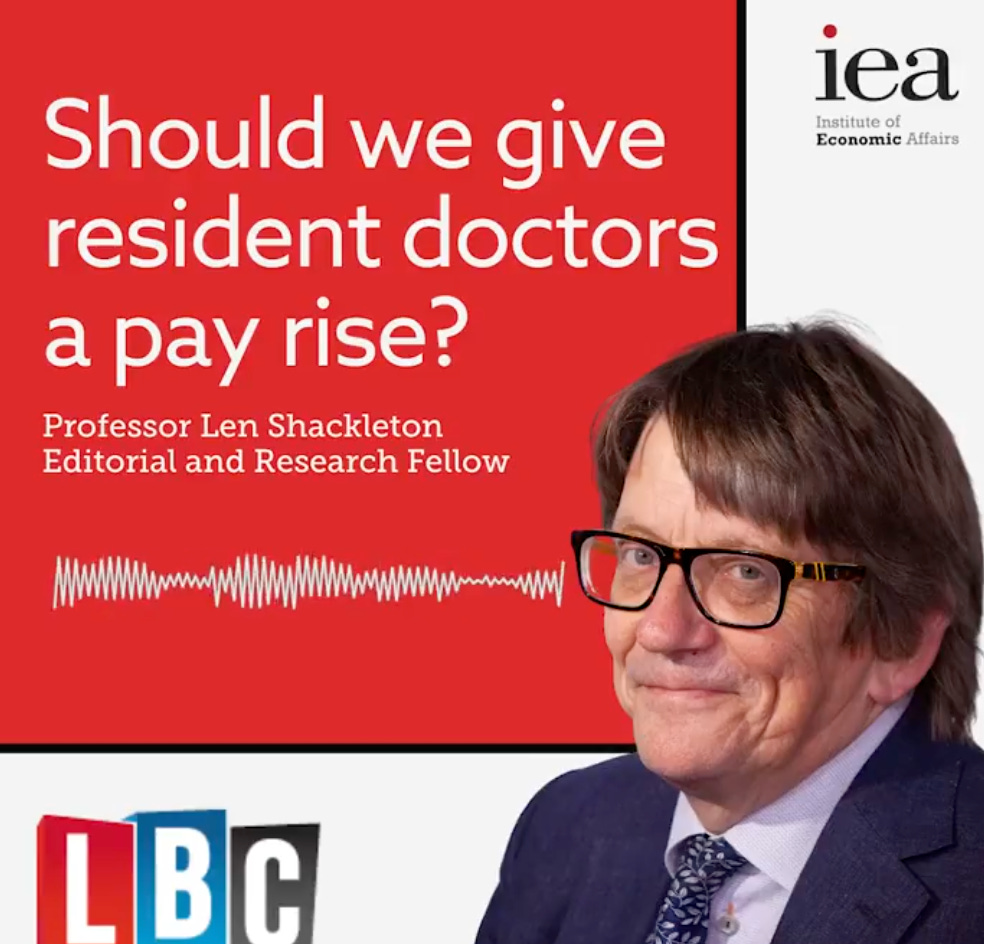Is anyone listening?
Plus: still no growth and wealth taxes (again)
In today’s newsletter:
Why do the OBR’s warnings keep falling on deaf ears?
Schools of Economic Thought
Wealth taxes are still a bad idea
It is hard not to feel some sympathy for the Office for Budget Responsibility. At least once a year the independent fiscal watchdog barks another warning that the UK public finances are on an unsustainable path. Nonetheless, successive governments have been unable, or unwilling, to take the actions necessary to change course.
The OBR’s latest ‘Fiscal (Un)Sustainability Report’ was no different. If anything, the risks are now even greater, with the UK government’s cost of borrowing consistently the highest in the G7, and no sign that welfare spending will ever be brought under control.
Too many subjects are still taboo, such as real reform of the NHS, or unpicking the ‘triple lock’ on the state pension. Politicians must be more honest with the public about the costs and trade-offs involved. But voters also need to be more willing to listen and stop endulging in ‘cakeism’, expecting the government to keep doing more without having to bear any additional burden themselves.
There has even been speculation that the UK could eventually require another IMF bailout, reminiscent of the situation in 1976. Although such an outcome remains highly unlikely, the mere discussion of this possibility is telling.
Major economies with their own central banks and borrowing in their own currencies typically do not require external assistance. While the UK's public debt to national income ratio is currently about double what it was in the 1970s, the country is not experiencing a balance of payments crisis; the pound remains stable, and both inflation and interest rates are significantly lower than back then.
Most importantly, the IMF bailout in 1976 was a US dollar loan intended to meet international obligations and support sterling, rather than to service local currency debt.
Instead, two big changes are needed to turn the public finances around – and over time they are still possible. First, the state should become smaller and more efficient. Second, and related to this, productivity has to improve across the whole economy.
On unchanged policies, public debt is already heading for an eye-watering 270% of national income within 50 years, even if productivity growth recovers to average 1.5% per year. But if productivity growth remains weak at recent levels around 0.5%, the OBR report showed that this figure could explode to 647%.
That should really set the alarm bills ringing. But is anyone listening?
Julian Jessop
Economics Fellow
The best way to never miss out on IEA work, get access to exclusive content, and support our research and educational programmes is to become a paid IEA Insider.
IEA Podcast: Executive Director Tom Clougherty, Editorial Director Kristian Niemietz, and Director of Communications Callum Price discuss the OBR’s report, fantasy economics on left and right, and wealth taxes, IEA YouTube
An Introduction to Schools of Economic Thought
Modern economics education has "forgotten its own history", focusing on mathematical models rather than understanding different approaches to economic problems
A new book explains how ten major schools of thought offer different solutions to economic challenges
It reveals how Austrian School economists predicted government policy failures decades before they occurred, while Keynesian approaches dominated discourse despite systemic flaws
An Introduction to Schools of Economic Thought, published by the Institute of Economic Affairs this week and authored by Eamonn Butler, traces the evolution of economic ideas from Ancient Greece to modern Behavioural Economics. The book demonstrates how different schools of thought, including the Classical School, Austrian School, Chicago School, and Keynesian approaches, offer radically different explanations for how economies work and what governments should do about economic problems.
Watch Eamonn Butler on the different schools of economic thought on the IEA YouTube channel
News and Views
A wealth tax would be economic suicide, Tom Clougherty dismantles the logic behind a wealth tax in The Times
“A wealth tax is unlikely to help the government’s fiscal position much in the short term, given implementation challenges and the behavioural response it would cause. In the longer run, it would be yet another hit to economic growth – a self-inflicted wound that leaves us all worse off.”
Don't let anybody tell you that the cost of this can be covered by taxing other people, Callum Price lays bare the scale of our fiscal problem on TalkTV
UK Smoking Ban and Black Market Chaos, Catch up on our event on the generational tobacco ban, IEA YouTube
The idea that we can just fork out a large sum of money to satisfy one group of workers is I think very short sighted', Len Shackleton on the doctor’s strike, LBC
Why do we have high energy costs? We've actively restricted the supply of energy ... these problems are the government's fault, Reem Ibrahim breaks down Britain’s self-inflicted energy crisis on TalkTV
What’s so bad about a wealth tax? Kristian Niemietz answers in CityAM
“If the government is concerned about wealth inequality, there is a much simpler way to address that issue: build more houses. That would effectively “redistribute” property wealth, while growing the pie at the same time. Don’t tax wealth – multiply it.”
Britain will follow Australia into a crime storm with the Tobacco and Vapes bill, Chris Snowdon laments in The Telegraph
International Programmes Manager Harrison Griffiths was in Lviv, Ukraine.
Last week, Harrison spoke at the Ukrainian Renaissance Conference in the city of Lviv. The conference was co-hosted by Students for Liberty, the Czech Institut Liberálních Studií, and the Whetstone Freedom Fund's Ukrainian partner, Ukrainian Students for Freedom. Harrison spoke about Britain and Europe's efforts to rearm and support Ukraine, emphasising the need for economic growth to support defence against Russian aggression.







Good piece Julian. But you are missing the major point. The benefits system needs more money not less! …. And whilst we are at it, normal wages should be much higher too! We have to show there is a real benefit to being in work. There is a problem with the state pension. It’s half of a living wage. So both parts of the state system are underfunded. You are right, no one is listening! It can’t be that difficult to see it surely!? Government have their heads buried in a two sided set of nooks based on a household budget! And it seems most pundits (economists) also can’t see beyond cuts to balance overspending prior to borrowing. You are right in one way, Government needs streamlining alright! Starting with the House of Lords! Our tax system is so complicated even Chancellors don’t understand it!! For example, what is income tax all about? Really!!?? It’s not paid by the employee! It’s paid by the employer!! So is NIC. We are all led to believe it’s paid by workers! But it’s not!! It’s triggered and calculated by spending on wages but it’s a red herring. It’s highway robbery . You don’t get and you can’t spend it so where is the payment? Let’s do away with it. People lie and hide earnings and it’s very costly to manage. So do away with it! … next, why do politicians and pundits alike, still treat the economy like a household budget!?… they are in charge of rule making. So if the tax system is not performing bloody well change the system!!!…. And stop looking constantly at cuts! STOP!…instead, try to see the economy as it has to be. That is in three dimensions, as the money has to revolve back again to make the cycle happen again snd again snd again! So money comes in, goes out and then crucially has to have a way to come back again and then, in a fast time to make sure we all have it in the time frame of life…. Monthly! Yes Julian, we need money to return! We all need it to rotate and wash round all of us to trigger tax take. Without it moving around our monthly economy we can’t get it back nor can we afford paying the increased tax take Reeves needs to stop us borrowing or making cuts. If you properly think it through, All tax is Triggered only by SPENDING! Like when an employer spends on wages for employees! Or when we spend or have to spend triggering Council tax, VAT and duty! Do you not see income tax and NIC take less than half of all tax. The ratio is about 60/40. 40% is income tax and NIC. 60% is vat, duty and everything else! …. But think about employers paying income tax and NIC because that spending triggers those taxes then all tax, 100% is triggered by spending!! If that is the case, and it is, then we need more spending to increase tax take and increase revenue. So without cuts and without borrowing and without new taxes or tax streams we, can achieve more than sufficient tax revenue from increased spending into the monthly working pot we all use!….except we don’t all contribute!?? … there are two types of citizens in this mix. You wrongly assume that all money is in play at any one time?…. It’s not!…. One group of citizens spend all their money each month. And one group doesn’t. This group only spends part of their income or none of it! The former group who spend all their money contribute 100% of their possible tax contributions every month from vat and duty etc. the later group, contribute nothing to our tax needs by NOT SPENDING all their money! … yes, no tax is triggered on money that is unspent, unused and idle. So there is the problem right there. Money not used not spent and hoarded contributes nothing to our tax needs! Nothing!! Nada!!!…. And more than that, the money held outside our economy and not revolving within it shows it is not contributing anything to enable others to pay more tax either! So idle money pays no tax, is not contributing to the working pot, so we are all devoid of it and then consider the fourth dimension ….time. If it’s held for centuries it’s never going to help us! It needs to revolve. We need a tsunami of spending not cuts and borrowing and blaming the disabled for Gods sake. We live in a democracy which is presently allowing a minority of people to hold up to 95% of our money outside our economy! They’d not just immoral and unfair it’s undemocratic!!! We need to change it and change it fast! Stop limiting our vision by assuming cuts in welfare and pensions are too expensive, they are not! Stop limiting work to a level equivalent to a disabled person. No triple benefits and increase wages by more than double that! Make us all happy and not the few. I’m up for them earning as much as is possible, but they have to spend it back! And in the same month! Ironically the rich roll also be richer! Just on stuff not money itself. Bring back exchange control and use just digital money! Just have vat! It’s easy and streamlined. It’s perpetual and autonomous and needs no checks. Have one pension. S state pension. Have it at say treble what it is now! Make us happy. Think in four dimensions instead of telling everyone to suffer!